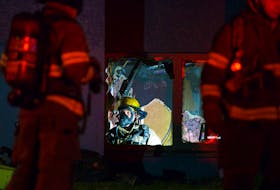Cpl. Jamie MacWhirter didn’t know he suffered from post traumatic stress disorder (PTSD) following his seventh-month tour of duty in Afghanistan back in 2006, but he knew something was wrong the moment he walked away from that grocery cart.
“The day after I got back, I went to Sobeys and started shopping,” he said. “I walk up and there’s five guys in a lineup and I can’t go up to talk to them.
“I leave the cart and I walk out of Sobeys and I don’t know why. It’s like a fear of strangers.”
MacWhirter spoke of his experience with PTSD Wednesday night at the Heroes are Human 2014 Tour at the Greenwood Hotel and Suites.
The event was for emergency services and military personnel to share their stories and learn from mental health professionals who presented the latest in research and treatments for operational stress injuries.
His PTSD developed after seeing so many children killed during his mission. It hits him hard to see those from his tour who have turned to alcohol, or gotten divorced, remarried and divorced again, a shell of their former selves.
“There’s not many left from my tour who are still in,” said MacWhirter, who was a refueler driver for the infantry in Afghanistan, but is now stationed as a dispatcher in St. John’s.
“There’s not too many of us left.”
He said he was “very close” to falling into that trap himself, recalling an instance when he literally had to stop his wife Vanessa at the door.
“She was ready to walk out, just tired of me yelling and screaming,” he said. “She was tired of me hiding away from people and I could see how that gets tiring after a while.
“It’s almost like she didn’t want to help someone who doesn’t want to help themselves,” he added. “And at the time, I didn’t want to help myself.”
He had met his wife before he went overseas and actually broke up with her when he did because, not knowing what would happen or if he would ever even come back home, he didn’t want to drag her and her son from a previous relationship, Avery, into all of that.
“But she stuck by me for the whole tour,” he said.
Knowing his personality so well, Vanessa was the first to notice the change in him.
“I didn’t see any symptoms, but my wife said she could see them,” he said. “The only symptoms I thought of was I didn’t want to be in a crowd.”
He didn’t seek help for his mental illness until more than a year after returning from Afghanistan, but now he speaks with mental health professionals regularly and will continue to do so until this July.
The birth of the couple’s first son, the now-five-year-old Cody, was the catalyst for changing McWhirter’s outlook and allowing him to address the problems.
“One day I snapped at my kids and I see terror in their eyes,” he said. “I swore never again, never again.”
Following that incident, MacWhirter developed a “safe word” for when he was having a rough day.
“If I come in and say the word ‘turnip,’ my family leaves me alone,” he said. “I carry on, calm down and then I come back.”
He released a book last summer entitled, “A Solider’s Tale: A Newfoundland Soldier in Afghanistan,” which he said was about how he got PTSD. He’s working on another book where he said he’ll try to write about how to beat PTSD.
“Or, not to beat it, but how to cope with it,” he said. “I don’t know if you ever really beat it.”
MacWhirter feels many in attendance Wednesday night may be suffering from PTSD themselves and were present to learn more about it and find out how to get help.
“Like I said tonight, if you don’t want to talk to anybody, talk to me,” he said. “I said that in a few of these little speech things and people are doing it.
“I’m getting a lot of emails, I spend a lot of nights responding to them, chatting to them on Facebook,” he added. “I like it ... I feel like I’m helping somebody anyway.”
Tara Gillam, of Corner Brook, was one of those who listened to MacWhirter speak, which she said was really interesting.
“I think it’s for the general public, that we need to address our mental health issues in our emergency services people,” she said.
Retired firefighter Wally Hartson, who gave his own speech as a sufferer of depression Tuesday night at a Mental Health Week luncheon, said he could relate to everything MacWhirter said.
“I understood what he was saying ... it meant a whole lot to me,” he said. “This message, I hope it gets through ... There’s help out there. Ask for it.”
Cpl. Jamie MacWhirter didn’t know he suffered from post traumatic stress disorder (PTSD) following his seventh-month tour of duty in Afghanistan back in 2006, but he knew something was wrong the moment he walked away from that grocery cart.
“The day after I got back, I went to Sobeys and started shopping,” he said. “I walk up and there’s five guys in a lineup and I can’t go up to talk to them.
“I leave the cart and I walk out of Sobeys and I don’t know why. It’s like a fear of strangers.”
MacWhirter spoke of his experience with PTSD Wednesday night at the Heroes are Human 2014 Tour at the Greenwood Hotel and Suites.
The event was for emergency services and military personnel to share their stories and learn from mental health professionals who presented the latest in research and treatments for operational stress injuries.
His PTSD developed after seeing so many children killed during his mission. It hits him hard to see those from his tour who have turned to alcohol, or gotten divorced, remarried and divorced again, a shell of their former selves.
“There’s not many left from my tour who are still in,” said MacWhirter, who was a refueler driver for the infantry in Afghanistan, but is now stationed as a dispatcher in St. John’s.
“There’s not too many of us left.”
He said he was “very close” to falling into that trap himself, recalling an instance when he literally had to stop his wife Vanessa at the door.
“She was ready to walk out, just tired of me yelling and screaming,” he said. “She was tired of me hiding away from people and I could see how that gets tiring after a while.
“It’s almost like she didn’t want to help someone who doesn’t want to help themselves,” he added. “And at the time, I didn’t want to help myself.”
He had met his wife before he went overseas and actually broke up with her when he did because, not knowing what would happen or if he would ever even come back home, he didn’t want to drag her and her son from a previous relationship, Avery, into all of that.
“But she stuck by me for the whole tour,” he said.
Knowing his personality so well, Vanessa was the first to notice the change in him.
“I didn’t see any symptoms, but my wife said she could see them,” he said. “The only symptoms I thought of was I didn’t want to be in a crowd.”
He didn’t seek help for his mental illness until more than a year after returning from Afghanistan, but now he speaks with mental health professionals regularly and will continue to do so until this July.
The birth of the couple’s first son, the now-five-year-old Cody, was the catalyst for changing McWhirter’s outlook and allowing him to address the problems.
“One day I snapped at my kids and I see terror in their eyes,” he said. “I swore never again, never again.”
Following that incident, MacWhirter developed a “safe word” for when he was having a rough day.
“If I come in and say the word ‘turnip,’ my family leaves me alone,” he said. “I carry on, calm down and then I come back.”
He released a book last summer entitled, “A Solider’s Tale: A Newfoundland Soldier in Afghanistan,” which he said was about how he got PTSD. He’s working on another book where he said he’ll try to write about how to beat PTSD.
“Or, not to beat it, but how to cope with it,” he said. “I don’t know if you ever really beat it.”
MacWhirter feels many in attendance Wednesday night may be suffering from PTSD themselves and were present to learn more about it and find out how to get help.
“Like I said tonight, if you don’t want to talk to anybody, talk to me,” he said. “I said that in a few of these little speech things and people are doing it.
“I’m getting a lot of emails, I spend a lot of nights responding to them, chatting to them on Facebook,” he added. “I like it ... I feel like I’m helping somebody anyway.”
Tara Gillam, of Corner Brook, was one of those who listened to MacWhirter speak, which she said was really interesting.
“I think it’s for the general public, that we need to address our mental health issues in our emergency services people,” she said.
Retired firefighter Wally Hartson, who gave his own speech as a sufferer of depression Tuesday night at a Mental Health Week luncheon, said he could relate to everything MacWhirter said.
“I understood what he was saying ... it meant a whole lot to me,” he said. “This message, I hope it gets through ... There’s help out there. Ask for it.”









